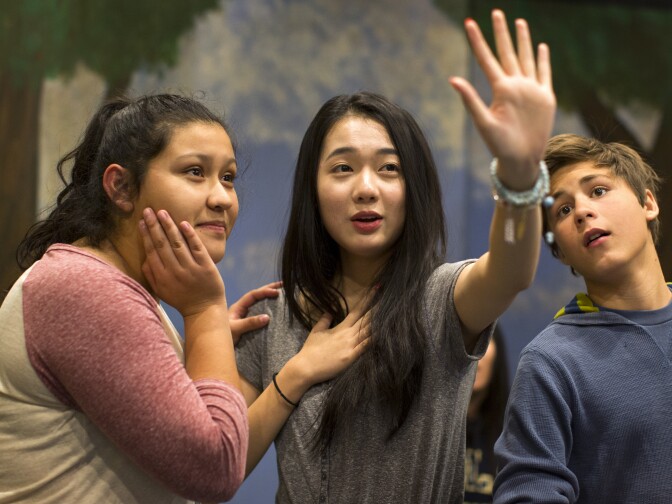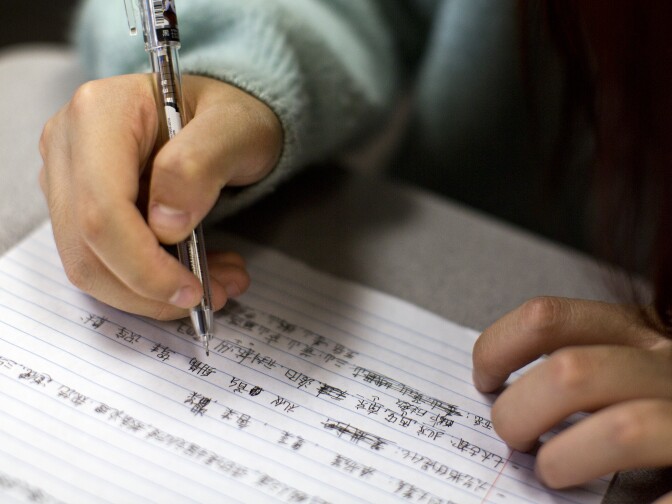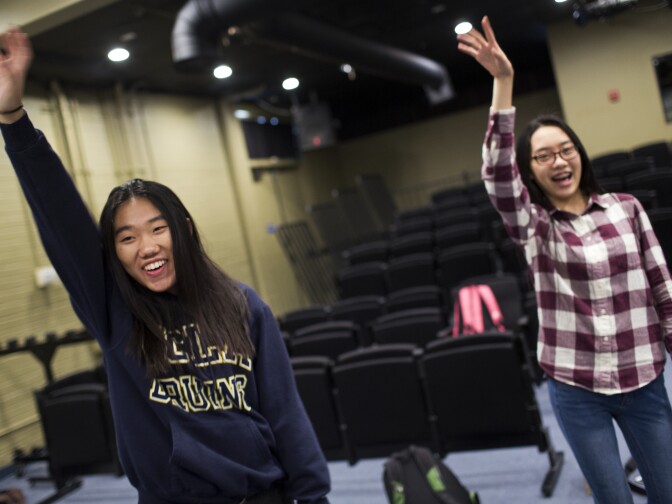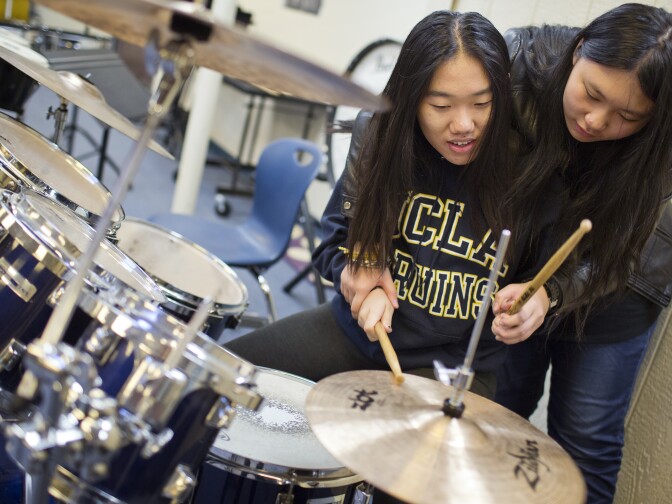This story is free to read because readers choose to support LAist. If you find value in independent local reporting, make a donation to power our newsroom today.
This archival content was originally written for and published on KPCC.org. Keep in mind that links and images may no longer work — and references may be outdated.
Alone in US, Chinese 'parachute kids' seek diplomas, independence at SoCal private schools
In a high school theater in Arcadia, Amber Zhang and the rest of the teenage cast gathered into a tight circle.
"Everyone say, 'Hey, hey, hey!" bellowed Xochitl-Julisa Bermejo, an instructor at Arroyo Pacific Academy. "Helloooo!"
Zhang, cast as a spunky ingénue, threw her body — and pipes — into the exercise.
"In China, if we have class, for sure we sit down on a chair," said Zhang, the 17-year-old only child of doctors in Guangzhou. "Not a lot of time to have fun like this."
Zhang belongs to a growing population of teens leaving the test-driven, high-pressure world of Chinese schools for the U.S. — more than 23,000 at last count, according to the Institute of International Education. Their goal is to better their chances of getting into an American college; a degree earned in the U.S. carries a lot of weight, according to families. At the same time, students enjoy the looser contours of an American education, one that students like Zhang say lets them be more creative and independent.
For decades, they've been referred to as "parachute kids" because they’re dropped off to study in the States. It's a trend that immigrants from Hong Kong, Taiwan and Korea popularized in the 1980s. The numbers from China have grown fast because of the sheer size of its population and the rise of a wealthy class buoyed by years of economic growth.
Census numbers reflect this migration pattern, too. Among the age groups of Chinese immigrants seeing the biggest growth is the 15-19 crowd. So many Chinese teens have come to the U.S. that the overall age of Chinese immigrants in the U.S. now skews younger, according to the Census Bureau.

California is the top destination for these students, and particularly popular is the San Gabriel Valley, home to one of the world's largest Chinese diasporas. Many live with host families and attend private schools like Arroyo Pacific. U.S. immigration law gives them little choice: International students can attend public schools for just one year and must reimburse the school district.
At lunch, Mandarin fills the hallways, the accents originating from all over China —Beijing, Shanghai and Guangzhou. In a matter of six years, Chinese students have transformed Arroyo Pacific's student body. Where there were just a handful of Chinese students before, the school is now more than 70 percent Chinese, said Robert Nguyen, the school's director of admissions. He said many students are learning about the school by word-of-mouth.
"Being a small school with small class sizes, we can pretty much tailor our program to suit the students pretty well," Nguyen said.
Students here work hard, going to tutoring after school, or hopping into an Uber to study at the nearby Starbucks with friends. But they say the workload is considerably more manageable than in China, where high schoolers are expected to prepare for China’s national college-entrance exam gaokao, which literally means "high test." It’s given just once a year and takes nine hours to complete. Senior Jesse Chou said when he was in China, he used to stay at school until 10 p.m. doing test prep. Failure was not an option.
"That means your life is done. Most people think that," said Chou, who now has free time to go skateboarding.
It's understandable why Chinese students feel so much pressure, said Yong Zhao, a professor at the University of Oregon who wrote the book "Who's Afraid of the Big Bad Dragon?: Why China Has the Best (and Worst) Education System in the World." He said a student's school in China will often determine where he or she is eventually employed.
"There are Chinese employers — they sometimes say that those who are not graduates of top elite universities need not to apply," Zhao said.
Coming to the U.S. does get Chinese students out of gaokao but they’re still expected to aim for the best universities in the U.S. At Platinum Academy, a tutoring center in Temple City, the walls are lined with drawings students have made of college logos.
"You’ve got Harvard, you’ve got Princeton and Yale — the big three," said David Ho, who founded the center. "Some would be delighted at UCLA and USC."
Tutoring lessons are just one of the many expenses that go into educating a Chinese teen in the U.S. Factor in homestays and private school tuition, and the bill soars above $45,000 a year.
But money’s not a barrier for many families. What can be tough is separation from parents. Arianna Sun, a student at Platinum Academy whose parents own a spa and resort in China, said she dreads each time she has to say good-bye to her family.
"I will feel very terrible for about two weeks, or more than two weeks," Sun said.
Sociologists say loneliness can be a problem for parachute kids, with some retreating from classmates and teachers. Others lash out. In a notorious case last year, a group of Chinese teens, some of them enrolled at a private school in Rowland Heights, attacked another Chinese teen. Three of the assailants pleaded no contest to charges of kidnapping and assault and are serving prison time.
"If kids are going abroad too young without their parents, they could be at risk of not having the proper supervision," said UCLA sociologist Min Zhou.
Amber Zhang said none of her classmates would ever act out violently. But she said some do ignore homework, preferring to play and spend their parents’ money on luxury brands.
"Their shoes are very expensive," Zhang said. "Like average is like one thousand dollars."
But Zhang is the granddaughter of farmers and steelworkers. And her doctor parents don’t let her forget that.
"My parents were born poor, and they work hard," Zhang said. "So since I grow up, they always tell me 'You need to try hard'.”
That doesn’t mean she’ll follow in her parents’ footsteps though. She said she dreams of going to UCLA film school and making movies someday.



















